剑桥初级英语语法Unit1amis are
- 格式:doc
- 大小:26.50 KB
- 文档页数:1
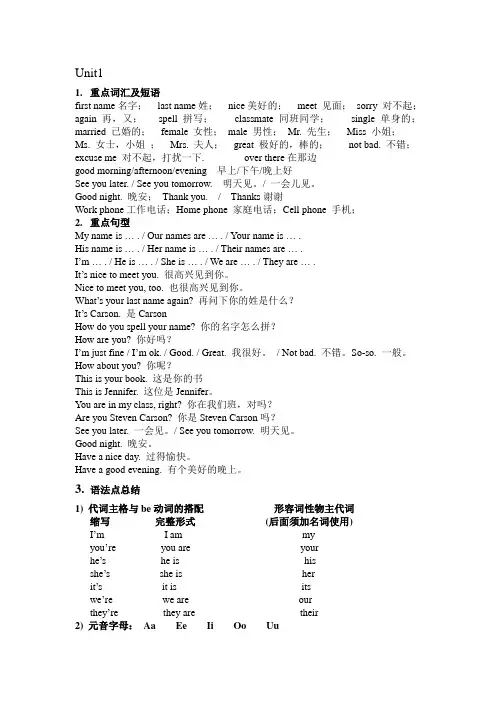
1.重点词汇及短语first name名字;last name姓;nice美好的;meet 见面;sorry 对不起;again 再,又;spell 拼写;classmate同班同学;single 单身的;married 已婚的;female 女性;male 男性;Mr. 先生;Miss 小姐;Ms. 女士,小姐;Mrs. 夫人;great 极好的,棒的;not bad. 不错;excuse me 对不起,打扰一下. over there在那边good morning/afternoon/evening 早上/下午/晚上好See you later. / See you tomorrow. 明天见。
/ 一会儿见。
Good night. 晚安;Thank you. / Thanks谢谢Work phone工作电话;Home phone 家庭电话;Cell phone 手机;2.重点句型My name is … . / Our names are … . / Your name is … .His name is … . / Her name is … . / Their names are … .I’m … . / He is … . / She is … . / We are … . / They are … .It’s nice to meet you. 很高兴见到你。
Nice to meet you, too. 也很高兴见到你。
What’s your last name again? 再问下你的姓是什么?It’s Carson. 是CarsonHow do you spell your name? 你的名字怎么拼?How are you? 你好吗?I’m just fine / I’m ok. / Good. / Great. 我很好。
/ Not bad. 不错。
So-so. 一般。
How about you? 你呢?This is your book. 这是你的书This is Jennifer. 这位是Jennifer。
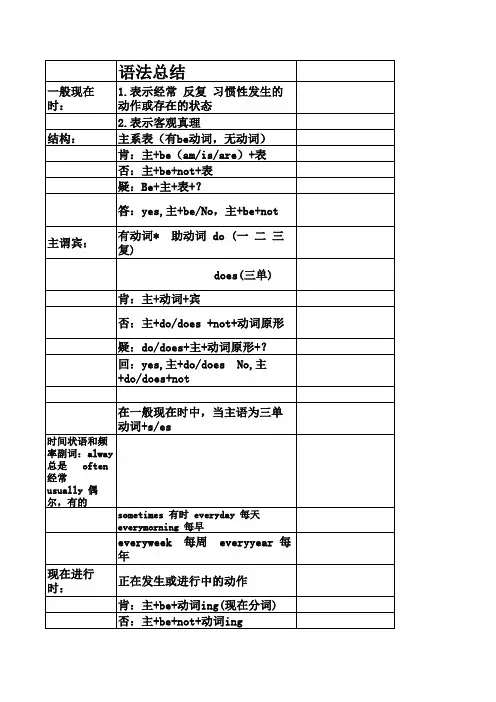
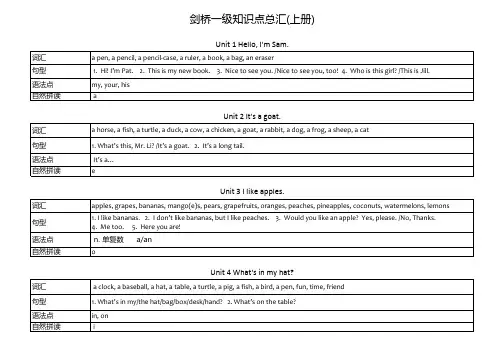
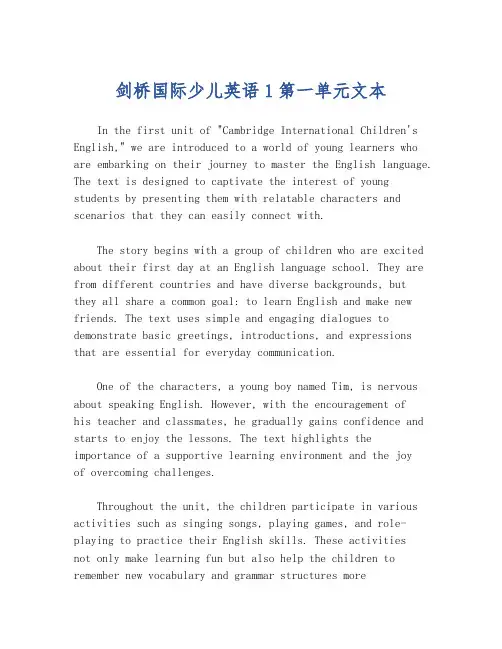
剑桥国际少儿英语1第一单元文本In the first unit of "Cambridge International Children's English," we are introduced to a world of young learners who are embarking on their journey to master the English language. The text is designed to captivate the interest of young students by presenting them with relatable characters and scenarios that they can easily connect with.The story begins with a group of children who are excited about their first day at an English language school. They are from different countries and have diverse backgrounds, butthey all share a common goal: to learn English and make new friends. The text uses simple and engaging dialogues to demonstrate basic greetings, introductions, and expressions that are essential for everyday communication.One of the characters, a young boy named Tim, is nervous about speaking English. However, with the encouragement ofhis teacher and classmates, he gradually gains confidence and starts to enjoy the lessons. The text highlights the importance of a supportive learning environment and the joyof overcoming challenges.Throughout the unit, the children participate in various activities such as singing songs, playing games, and role-playing to practice their English skills. These activitiesnot only make learning fun but also help the children to remember new vocabulary and grammar structures moreeffectively.The unit also includes colorful illustrations andpictures that accompany the text, making it visually appealing for young learners. These visual aids serve as a helpful tool for understanding the context of the conversations and the actions of the characters.In conclusion, the first unit of "Cambridge International Children's English" sets a strong foundation for young learners by providing them with a fun and interactive introduction to the English language. It emphasizes the value of learning through interaction and encourages students to embrace the process of language acquisition with enthusiasm and curiosity.。
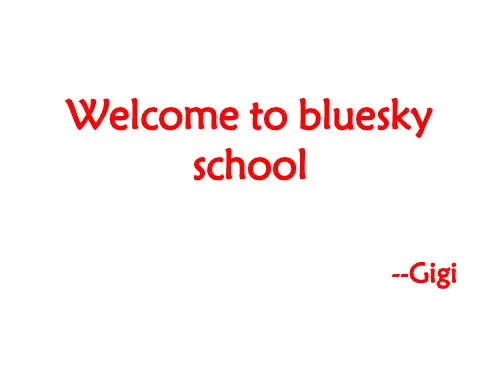

剑桥少儿英语第一级课堂笔记上册Unit 1 What's your name?1. What's your name (please)?My name is Andy / Liu / Dehua.I am Andy / Liu / Dehua.英文名首字母大写;汉语名姓首字母大写,名首字母大写。
2. 介绍朋友:I am → I'm be 动词am are is (是,在)he is → he'sshe is → she's 记忆歌:我用amit is → it's 你用arewe are → we're is跟着他、她、它they are → they're 复数一律用长are3. How old are you?I am 7(Yours old).4. Boy's name: Ted Jeff…Girl's name: Kelly Meg…5.①come [kʌm] 来→(反)go [ɡo] 去②Let's play. 让我们玩。
△Let's = Let us + do (动词原形).③It's time to get up.△time [tɑim] 时间get up 起床It's time to do.6.* Mr. [mistə] 先生+ 姓氏(在学校中有“老师”的意思。
)Miss [mis]小姐+ 姓氏(在学校中有“老师”的意思。
)You are…你是……。
7.8. Come in, please. 请进。
close →(反) openGo to school. 上学。
don't = do not 不要be late [leit] 晚的,迟到learn [lə:n] 学习,学会again and again [ə'ɡein] 一次又一次地9. What's your name? (你的)My name is…I am…What's his name? (他的)His name is…He is…What's her name? (她的)Her name is…She is…10. 语音 a [æ]: Dan bag mat cape [e]: Ben pen leg neckUnit 2 What's this?1. What's this? this →(反) thatWhat's that? =>It's a …(当该句用于询问字母时,答句中无“a”,即It's “B”.)What's this in(△用) English? It's a …2. ①letter ['letə] 字母,信letter“A”②jump [ʤʌmp]v.跳③ A a B b C c D d E e F f G g[ei] [bi:] [si] [di:][i:] [ef] [ʤi:]H h I i J j K k L l M m N n[eiʧ] [ɑi] [ʤei] [kei] [el] [em] [en]O o P p Q q R r S s T t[əu] [pi:] [kju:] [ɑ:] [es] [ti:]U u V v W w X x Y y Z z[ju:] [vi:] ['dʌblju:] [eks] [wɑi] [zi:][zed]元音字母:a e i o u剩下的都是辅音字母。
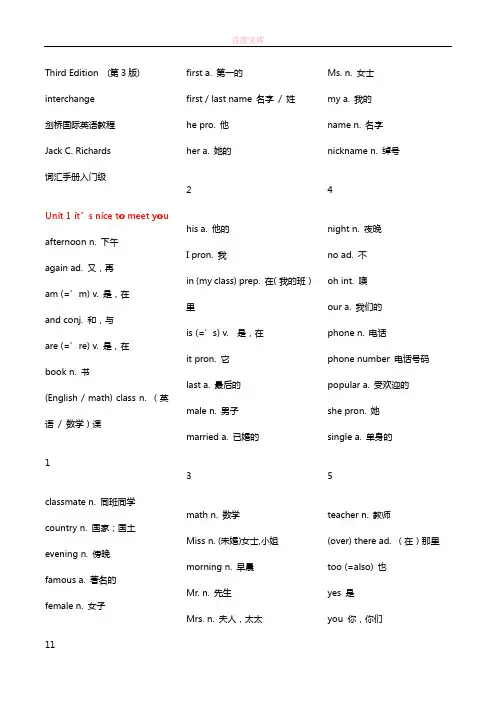
Third Edition (第3版) interchange剑桥国际英语教程Jack C. Richards词汇手册入门级Unit 1 it’s nice to meet you afternoon n. 下午again ad. 又,再am (=’m) v. 是,在and conj. 和,与are (=’re) v. 是,在book n. 书(English / math) class n. (英语/ 数学)课1classmate n. 同班同学country n. 国家;国土evening n. 傍晚famous a. 著名的female n. 女子first a. 第一的first / last name 名字/ 姓he pro. 他her a. 她的2his a. 他的I pron. 我in (my class) prep. 在(我的班)里is (=’s) v. 是,在it pron. 它last a. 最后的male n. 男子married a. 已婚的3math n. 数学Miss n. (未婚)女士,小姐morning n. 早晨Mr. n. 先生Mrs. n. 夫人,太太Ms. n. 女士my a. 我的name n. 名字nickname n. 绰号4night n. 夜晚no ad. 不oh int. 噢our a. 我们的phone n. 电话phone number 电话号码popular a. 受欢迎的she pron. 她single a. 单身的5teacher n. 教师(over) there ad. (在)那里too (=also) 也yes 是you 你,你们your 你的,你们的Unit2 What’s this? address 地址address book 地址簿bag 袋子,包behind 在……后面board 写字板book bag 书包box 盒子7briefcase 公文包(English)book (英语)书café咖啡厅,快餐店camera 照相机car 汽车cassette player 磁带放音机CD player CD机8cell phone (=cellphone)手机chair 椅子chopstick 筷子clock 钟,时钟desk 书桌(English)dictionary (英文)词典DVD player DVD机earring 耳环9encyclopedia 百科全书eraser 橡皮exercise 练习,训练glasses 眼镜gone 丢失的great 好的,伟大的10I bet 我认为……in front of 在……前面interesting 有趣的key 钥匙location 地点,场所notebook 笔记本now 好了(用于停顿或引起别人注意)11on 在……前面open 打开pen 钢笔pencil 铅笔pocket 口袋purse (女式)钱包Relax. 别担心。
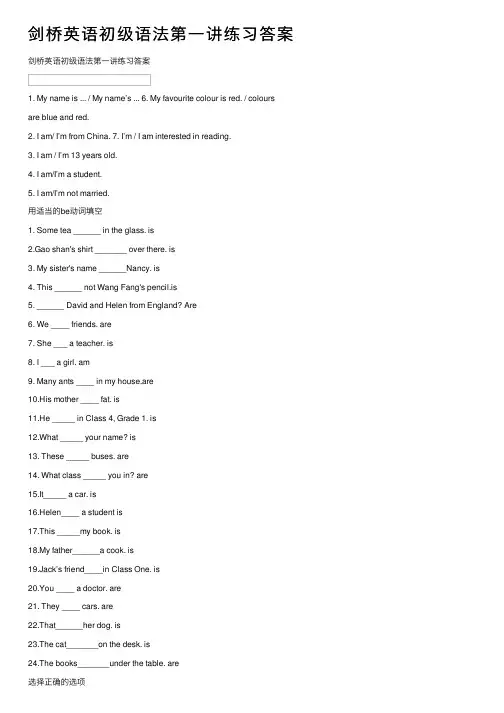
剑桥英语初级语法第⼀讲练习答案剑桥英语初级语法第⼀讲练习答案1. My name is ... / My name’s ... 6. My favourite colour is red. / coloursare blue and red.2. I am/ I’m from China. 7. I’m / I am interested in reading.3. I am / I’m 13 years old.4. I am/I’m a student.5. I am/I’m not married.⽤适当的be动词填空1. Some tea ______ in the glass. is2.Gao shan's shirt _______ over there. is3. My sister's name ______Nancy. is4. This ______ not Wang Fang's pencil.is5. ______ David and Helen from England? Are6. We ____ friends. are7. She ___ a teacher. is8. I ___ a girl. am9. Many ants ____ in my house.are10.His mother ____ fat. is11.He _____ in Class 4, Grade 1. is12.What _____ your name? is13. These _____ buses. are14. What class _____ you in? are15.It_____ a car. is16.Helen____ a student is17.This _____my book. is18.My father______a cook. is19.Jack’s friend____in Class One. is20.You ____ a doctor. are21. They ____ cars. are22.That______her dog. is23.The cat_______on the desk. is24.The books_______under the table. are选择正确的选项C 1.She ______ Miss Hen. A.be B.am C.isB 2.I ______ sorry. A./ B.am C.areA 3.Here ______ my ball. A.is B.are C.amA 4.You ______ number eight. A.are B.is C.amA 5.What_______this? A.is B.are C.beC 6.Helen____ a student. A.be B.am C.isB 7.Those _____oranges. A.is B.are C.amC 8. How old _____your teacher? A.be B.am C.isB 9. Where __ ___ her mother? A.are B.is C.amB 10.The two cups of milk _____ for me. A.is B.are C.be写出下列词适当形式:I’m 1.I am (缩略形式) ______ ‘s 2.is (复数)______We’re 3.we are (缩略形式) ______ aren’t 4.are not(缩略形式) ______ Isn’t 5.is not (缩略形式) ______ can’t 6.can not(缩略形式) ______ She is 7.she's(完整形式) ______ it is 8.it's(完整形式) ______They are 9.they're(完整形式) ______ do not 10.don't(完整形式) ______将下列句⼦变成否定句和⼀般疑问句1.His brother is a teacher.否定句: His brother isn’t / is not a teacher.⼀般疑问句: Is his brother a teacher?2.Those are his parents.否定句: Those aren’t / are not his parents.⼀般疑问句: Are those his parents?3.I’m 14 years old.否定句: I’m not 14 years old.⼀般疑问句: Are you 14 years old?4.The ruler is on the table.否定句: The ruler isn’t / is not on the table. ⼀般疑问句: Is the ruler on the table?5.Tom is my teacher .否定句: Ton isn’t / is not my teacher.⼀般疑问句: Is Tom your teacher?6.My shoes are 20 yuan .否定句: My shoes aren’t / are not 20 yuan. ⼀般疑问句: Are your shoes 20 yuans? 7.This is a pen .否定句: This isn’t / is not a pen.⼀般疑问句: Is this a pen?8.My name is Andy.否定句: My name isn’t Andy.⼀般疑问句: Is your name Andy?9.We are twins.否定句: We aren’t twins.⼀般疑问句: Are you twins?10.He is my brother.否定句: He isn’t my brother. ⼀般疑问句: Is he my brother?。
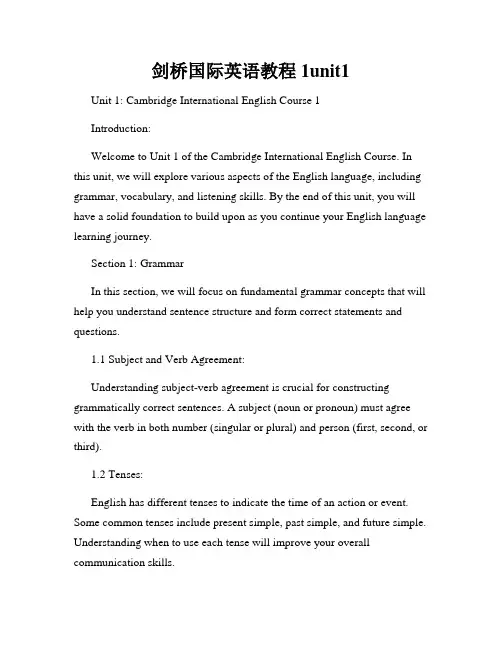
剑桥国际英语教程1unit1Unit 1: Cambridge International English Course 1Introduction:Welcome to Unit 1 of the Cambridge International English Course. In this unit, we will explore various aspects of the English language, including grammar, vocabulary, and listening skills. By the end of this unit, you will have a solid foundation to build upon as you continue your English language learning journey.Section 1: GrammarIn this section, we will focus on fundamental grammar concepts that will help you understand sentence structure and form correct statements and questions.1.1 Subject and Verb Agreement:Understanding subject-verb agreement is crucial for constructing grammatically correct sentences. A subject (noun or pronoun) must agree with the verb in both number (singular or plural) and person (first, second, or third).1.2 Tenses:English has different tenses to indicate the time of an action or event. Some common tenses include present simple, past simple, and future simple. Understanding when to use each tense will improve your overall communication skills.Section 2: VocabularyBuilding your vocabulary is essential for effective communication. In this section, we will explore strategies to expand your word bank and improve your language proficiency.2.1 Word Families:Word families consist of a base word and its related forms (nouns, verbs, adjectives, adverbs). Learning word families helps you understand how words are connected and how their meanings can be extended.2.2 Synonyms and Antonyms:Knowing synonyms (words with similar meanings) and antonyms (words with opposite meanings) allows you to express yourself more precisely and avoid repetition in your speech and writing.Section 3: Listening SkillsDeveloping your listening skills is crucial for engaging in conversations and understanding native speakers. In this section, we will provide strategies to enhance your listening abilities.3.1 Active Listening:Active listening involves focusing on the speaker, paying attention to verbal and nonverbal cues, and understanding the main ideas and supporting details. Practicing active listening will improve your overall comprehension skills.3.2 Note-Taking:Taking notes while listening helps you retain information and review key points later. Develop a system that works for you, whether it's using bullet points, diagrams, or abbreviations.Conclusion:Congratulations on completing Unit 1 of the Cambridge International English Course. By focusing on grammar, vocabulary, and listening skills, you have taken significant steps towards improving your English language proficiency. Remember to practice regularly and apply what you have learned in real-life situations. Good luck on your language learning journey!。
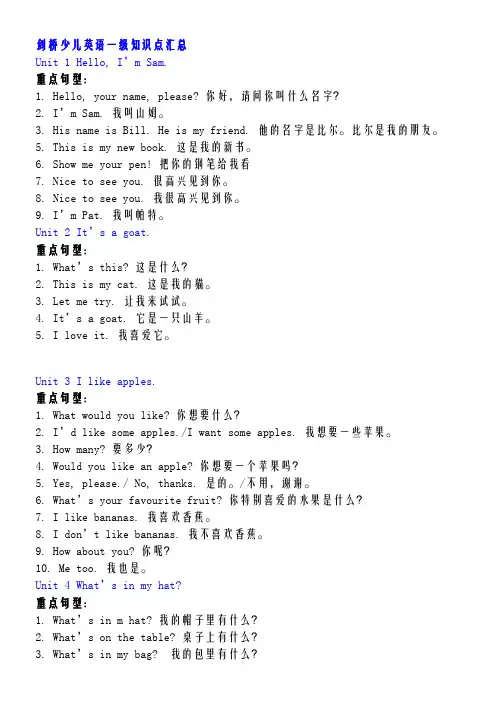
剑桥少儿英语一级知识点汇总Unit 1 Hello, I’m Sam.重点句型:1. Hello, your name, please? 你好,请问你叫什么名字?2. I’m Sam. 我叫山姆。
3. His name is Bill. He is my friend. 他的名字是比尔。
比尔是我的朋友。
5. This is my new book. 这是我的新书。
6. Show me your pen! 把你的钢笔给我看7. Nice to see you. 很高兴见到你。
8. Nice to see you. 我很高兴见到你。
9. I’m Pat. 我叫帕特。
Unit 2 It’s a goat.重点句型:1. What’s this? 这是什么?2. This is my cat. 这是我的猫。
3. Let me try. 让我来试试。
4. It’s a goat. 它是一只山羊。
5. I love it. 我喜爱它。
Unit 3 I like apples.重点句型:1. What would you like? 你想要什么?2. I’d like some apples./I want some apples. 我想要一些苹果。
3. How many? 要多少?4. Would you like an apple? 你想要一个苹果吗?5. Yes, please./ No, thanks. 是的。
/不用,谢谢。
6. What’s your favourite fruit? 你特别喜爱的水果是什么?7. I like bananas. 我喜欢香蕉。
8. I don’t like bananas. 我不喜欢香蕉。
9. How about you? 你呢?10. Me too. 我也是。
Unit 4 What’s in my hat?重点句型:1. What’s in m hat? 我的帽子里有什么?2. What’s on the table? 桌子上有什么?3. What’s in my bag? 我的包里有什么?4. What’s in my hand? 我的手里有什么?5. What’s in my desk? 我的桌子里有什么?6. What’s in your bag? 你的包里有什么?7. This is my friend. 答句这是我的朋友。
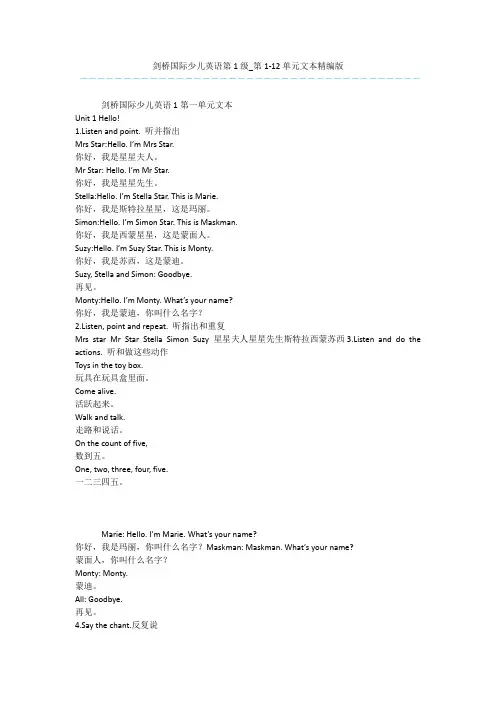
剑桥国际少儿英语第1级_第1-12单元文本精编版---------------------------------------剑桥国际少儿英语1第一单元文本Unit 1 Hello!1.Listen and point. 听并指出Mrs Star:Hello. I’m Mrs Star.你好,我是星星夫人。
Mr Star: Hello. I’m Mr Star.你好,我是星星先生。
Stella:Hello. I’m Stella Star. This is Marie.你好,我是斯特拉星星,这是玛丽。
Simon:Hello. I’m Simon Star. This is Maskman.你好,我是西蒙星星,这是蒙面人。
Suzy:Hello. I’m Suzy Star. This is Monty.你好,我是苏西,这是蒙迪。
Suzy, Stella and Simon: Goodbye.再见。
Monty:Hello. I’m Monty. What’s your name?你好,我是蒙迪,你叫什么名字?2.Listen, point and repeat. 听指出和重复Mrs star Mr Star Stella Simon Suzy 星星夫人星星先生斯特拉西蒙苏西3.Listen and do the actions. 听和做这些动作Toys in the toy box.玩具在玩具盒里面。
Come alive.活跃起来。
Walk and talk.走路和说话。
On the count of five,数到五。
One, two, three, four, five.一二三四五。
Marie: Hello. I’m Marie. What’s your name?你好,我是玛丽,你叫什么名字?Maskman: Maskman. What’s your name?蒙面人,你叫什么名字?Monty: Monty.蒙迪。
剑桥少儿英语一级知识点汇总剑桥少儿英语一级知识点汇总Unit 1 Hello, I’m Sam.重点词汇:【默写】一支钢笔 a pen,一支铅笔 a pencil,一个文具盒 a pencil-case,一把尺 a ruler,一本书 a book,一个书包 a bag,一块橡皮 an eraser【认读】新的 new,展示 show,朋友 friend,我的 my,你的 your,他的 his,她的 her,我们的 our,他们的 their重点句型:你好,请问你叫什么名字?Hello, your name, please? 我叫山姆。
I’m Sam. 他的名字是比尔。
比尔是我的朋友。
His name is Bill. He is my friend. 她的名字是安。
安是我的朋友。
Her name is Ann.She is my friend. 这是我的新书。
This is my new book. 把你的钢笔给我看Show me your pen! 很高兴见到你。
Nice to see you. 我很高兴见到你。
Nice to see you, too. 我也很高兴见到你。
我叫帕特。
I’m Pat.Unit 2 It’s a goat.重点词汇:【默写】马 horse,奶牛 cow,猫 cat,狗 dog,绵羊 sheep,鸭子 duck,兔子 rabbit,鸡chicken,青蛙 frog,乌龟 turtle,鱼 fish,山羊 goat【认读】长的 long,尾巴 tail,微笑 smile,大象 elephant,蜥蜴 lizard 重点句型:这是什么?What’s this? 这是我的猫。
This is my cat. 让我来试试。
Let me try. 它是一只山羊。
It’s a goat. 我喜爱它。
I love it.Unit 3 I like apples.重点词汇:【默写】苹果 apple-apples, pear-pears,梨香蕉 banana-bananas,菠萝pineapple-pineapples,桔子 orange-oranges ,西瓜 watermelon-watermelons ,椰子coconut-coconuts,柚子 grapefruit-grapefruits,葡萄 grape-grapes,芒果mango-mangoes,柠檬 lemon -lemons,桃子 peach-peaches,【认读】喜欢 like,想要 would like/want,一些 some,特别喜爱的 favourite,水果 fruit 重点句型:你想要什么?What would you like? 我想要一些苹果。
剑桥少儿英语的一级英语语法“剑桥少儿英语”是英国剑桥大学考试委员会专门为英语为非母语国家的少年儿童设计的学习系统。
目前,几百万适龄儿童在全世界50多个国家和地区进行学习。
下面是无忧考网整理的剑桥少儿英语的一级英语语法,希望对你们有帮助。
1、人称代词与be动词:1)人称代词--表示“我、你、他、我们、你们、他们等”的词叫做人称代词,用来代替人或物。
2)Be动词:am, is ,are 他们的意思相同,表示“是”3)人称代词与be动词的搭配:I---am, he----is, we---areshe---is they---areit ----- is you---are另外,is还用于一个人或者一个事物的后面,如Jim是6岁。
这时,Jim是一个人,Jim后面的是字就要用单词is来表示。
this,that 的后面也要用is .are用在多个人或物的后面,如Tom和Ann是五岁。
这时,Tom和Ann是两个人,后面的是字就要用单词are来表示。
am只用在我(I)的后面。
4)人称代词和be动词的缩写:I'm, he's, she's, it's, we're, they're, you're2、指示代词:表示这个那个,这些那些的词叫做指示代词。
指示代词有:这个this,那个that,这些these,那些those指示代词与be动词的搭配:this--is;that--is ;these--are;those-- are。
3、名词及名词的复数1)一般情况加–s,清辅音后读/s/ 浊辅音和元音后读/z/:girl-girls pen-pens bag-bags car-cars2)以s, sh, ch, x结尾加–es, 读/iz/ bus-buses watch-watches box-boxes brush-brushes3)结尾,变y 为i再加es, 读/z/ baby---babies但元音字母+y 结尾的名词变复数时,直接加s变复数。
剑桥国际英语教程-入门级对话中文翻译:第一单元:很高兴见到你对话一:Michael: Hi. My name is Michael Ota.麦克:嗨。
我的名字叫麦克•欧达。
Jennifer: I'm Jennifer Miller.珍妮弗:我是珍妮弗•米勒。
Michael: It's nice to meet you, Jennifer.麦克:很高兴见到你,珍妮弗。
Jennifer: Nice to meet you, too.珍妮弗:我也很高兴见到你。
Michael: I'm sorry. What's your last name again?麦克:对不起。
你姓什么来着?Jennifer: It's Miller.珍妮弗:叫米勒。
对话二:Jennifer: Excuse me , are you Steven Carson?珍妮弗:对不起,你是史蒂芬•卡森吗?David: No, I'm not ,he's over there.戴维:不,不是。
他在那儿。
Jennifer: Oh, I 'm sorry.珍妮弗:哦,对不起。
Jennifer: Steven, this is your book.珍妮弗:史蒂芬?这是你的书。
Steven: Oh,it's my maths book, thanks. You are in my class, right?斯蒂芬:哦,是我的数学书!谢谢。
你在我的班上,对吗?Jennifer: Yes, I am. I'm Jenefer Miller.珍妮弗:是的,我在。
我是珍妮弗•米勒。
Steven: It's nice to meet you.斯蒂芬:很高兴见到你。
Steven: Hey David, this is Jenefer , she's in our maths class.斯蒂芬:嗨,戴维,这是珍妮弗。
剑桥少儿英语一级上册Unit 1 Hello,I’m Sam重点词汇:Aa Bb Cc DdEeFfGg Hh IiJj KkLl Mm NnOo PpQq RrSs Tt UuVvWw Xx Yy ZzHello你好Hi你好boy男孩girl女孩teacher老师pen钢笔pencil铅笔pencil-box铅笔盒bag书包ruler尺子eraser橡皮my我的your你的his他的her她的its它的our我们的their他们的I我You你He他She她It它We我们They他们重点句型:1.表示问候和道别:(1)—--—Hello!你好!——-—Hello!你好!(2)—--—How are you?你好吗?-——-I’mfine。
我很好。
(3)————Niceto meetyou!见到你很高兴!—-—-Niceto meet you,too!见到你也很高兴!(4)—---Good—bye!再见!-—--Bye-bye!再见!2.表示介绍:(1)介绍姓名:—-—-What’s yourname?-———I am/my name is。
.。
.。
(2)介绍某人或某物:介绍某人This is+人名介绍某物This is+ a/an +某物(3)表示感谢:Thanks!/Thankyou!/Thank youvery much!小语法知识点:★1.人称代词口诀:我是I,你是You.男他He,女她She。
动事物它是It。
我们We, 你们You他们They。
物主代词口诀:我的my, 你的your,他的his, 她的her,它的its我们的our,你们的your,他们的their2.中英文姓名的书写:(1)姓名如果是两个字组成,姓和名的首字母都大写。
例如:Li Ming (李明)(2)姓名如果是三个字组成,姓和名字连接的第一个字母都大写。
例如:Wang Mingming(王明明)拓展练习:一.背写出26个英文字母的大小写,注意书写格式二。